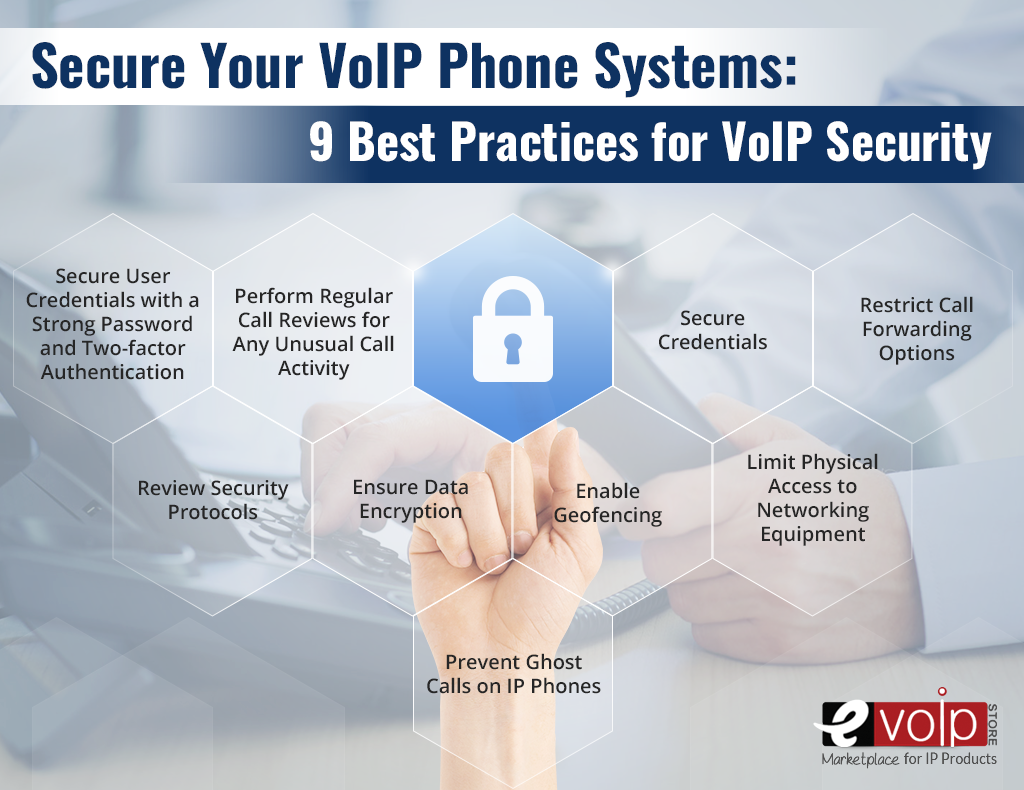Secure Your VoIP Phone Systems: 9 Best Practices for VoIP Security

The benefits of VoIP phone solutions are numerous, ranging from cost savings to business-class feature availability and expanded services. But, that also means that most of the security requirements, formerly handled by an internal company department, are now shared with your VoIP service provider. Let's take a look at the security measures to keep your VoIP security and your reputation protected from harmful hackers on the internet.
1. Secure User Credentials with a Strong Password and Two-factor Authentication
It goes without saying that it is critically important to change the password of your VoIP phone system. Like other network devices, VoIP phones come with a preset default password that needs to be changed right away. If your organization has a credential management policy, it is a good idea to apply the same standards to your VoIP phone systems. A strong credential management policy comprises of expiration and complexity requirements and is critical to effectively manage the security credentials. It’s a good practice to periodically remind employees to change their passwords.
2. Perform Regular Call Reviews for Any Unusual Call Activity
Call details allow you to identify the routine activities of your business. Reviewing those records lets you more readily identify unusual traffic, such as for non-regular call destinations, call lengths, or even account performing the traffic. Discuss any abnormalities with your VoIP service provider. Call recording capabilities are typically in control of the client through a VoIP user interface. Ensure you regularly check your online portal and turn your call recording to on or off depending upon your requirements.
3. Secure Credentials
It is advised not to share your credentials with third parties, leave information in unsecured places or software, or share by email or any other unsecured networks. If there is an information leak, immediately contact your VoIP service provider to re-generate your credentials and firewalls.
4. Restrict Call Forwarding Options
A premium feature of VoIP phone system - call forwarding, also presents an opportunity for fraudulent behaviour. Consider restricting your call forwarding settings on extensions and request assistance from your VoIP service provider to facilitate your preferred set up rules.
5. Review Security Protocols
Identify computer and hardware security needs for your VoIP phone systems, educate employees, establish roles for the IT team, and take measures to secure your environment.
6. Ensure Data Encryption
It is imperative to partner with VoIP service providers that encrypt the call processing data sent between the VoIP servers and your network. Ensure end-to-end encryption across all calls and messages to ensure the safety of your company data. It is crucial that your network is encrypted to prevent any damages caused by hackers sneaking around your systems. Even if someone is able to gain access, encrypted VoIP phone systems ensure that data is unusable to them.
7. Enable Geofencing
Hackers on the internet often try to leverage VoIP phone systems to make international calls that can rack up the charges on your account. Having your system network compromised is bad enough, but accumulating extra usage costs adds insult to injury. It is a good idea to enable geofencing if you deal with international clients. Geo-fencing is also used on network firewalls and email servers in order to prevent connections to countries where high numbers of potential hacks originate.
8. Limit Physical Access to Networking Equipment
Networking equipment should be stored in a limited-access room. Securing access to the physical hardware that protects your network is key to ensuring safety to all your IT systems, including VoIP. Installation of security cameras and implementing an access log that is audited on a regular basis is recommended to securing your networking room in addition to limited access.
9. Prevent Ghost Calls on IP Phones
Ghost calls are incoming calls where there is no one on the other end and is just a way for hackers to try infiltrating into your VoIP phone systems. When hackers look for systems to exploit, they perform something called port-scanning. This is a method where they send out specific data requests to millions of IP addresses and then listen for anything that responds. However, if your VoIP phone system is protected, then there are very little chances that the hacker can gain access to your system.
Luckily, there is a way to prevent these ghost calls. Most IP Phones have a certain setting that tells the VoIP phones to accept incoming calls only from the server they are connected to. Contact your VoIP service provider and access this setting to prevent ghost calls.
Apart from keeping in line the aforementioned practices, it is critical to have a conversation with your IT department to see what tools are available to ensure you are updated on every security requirement.
